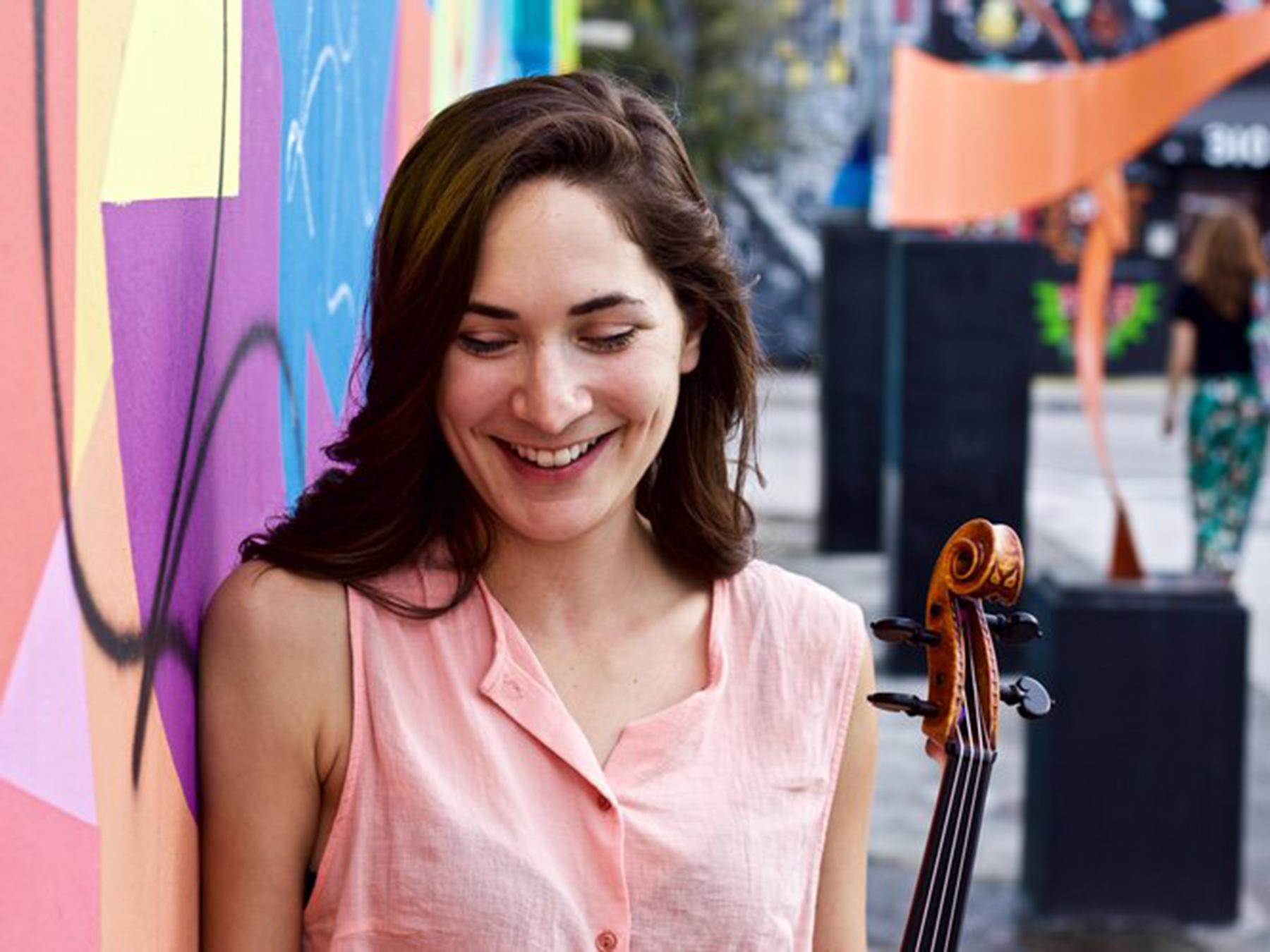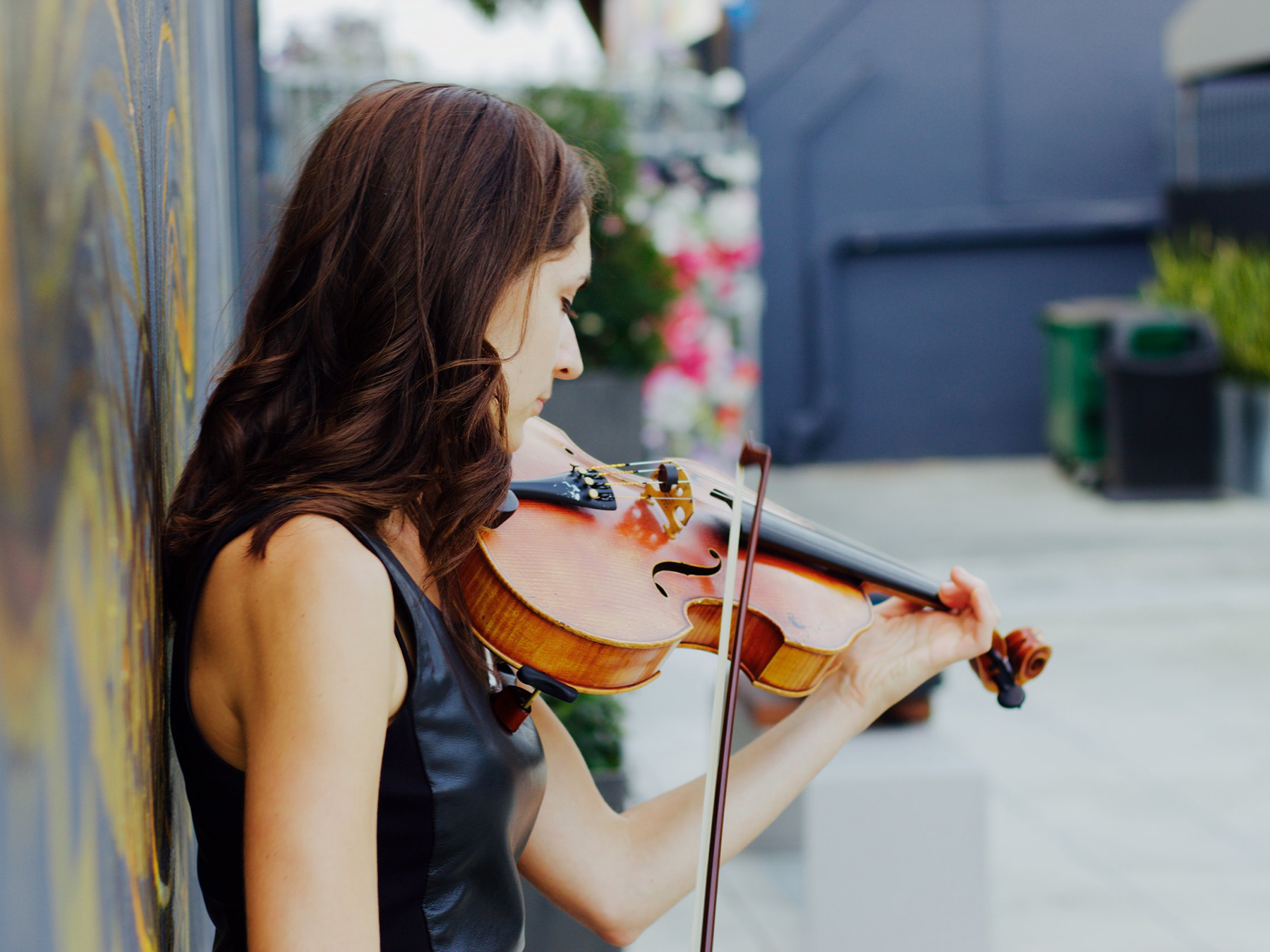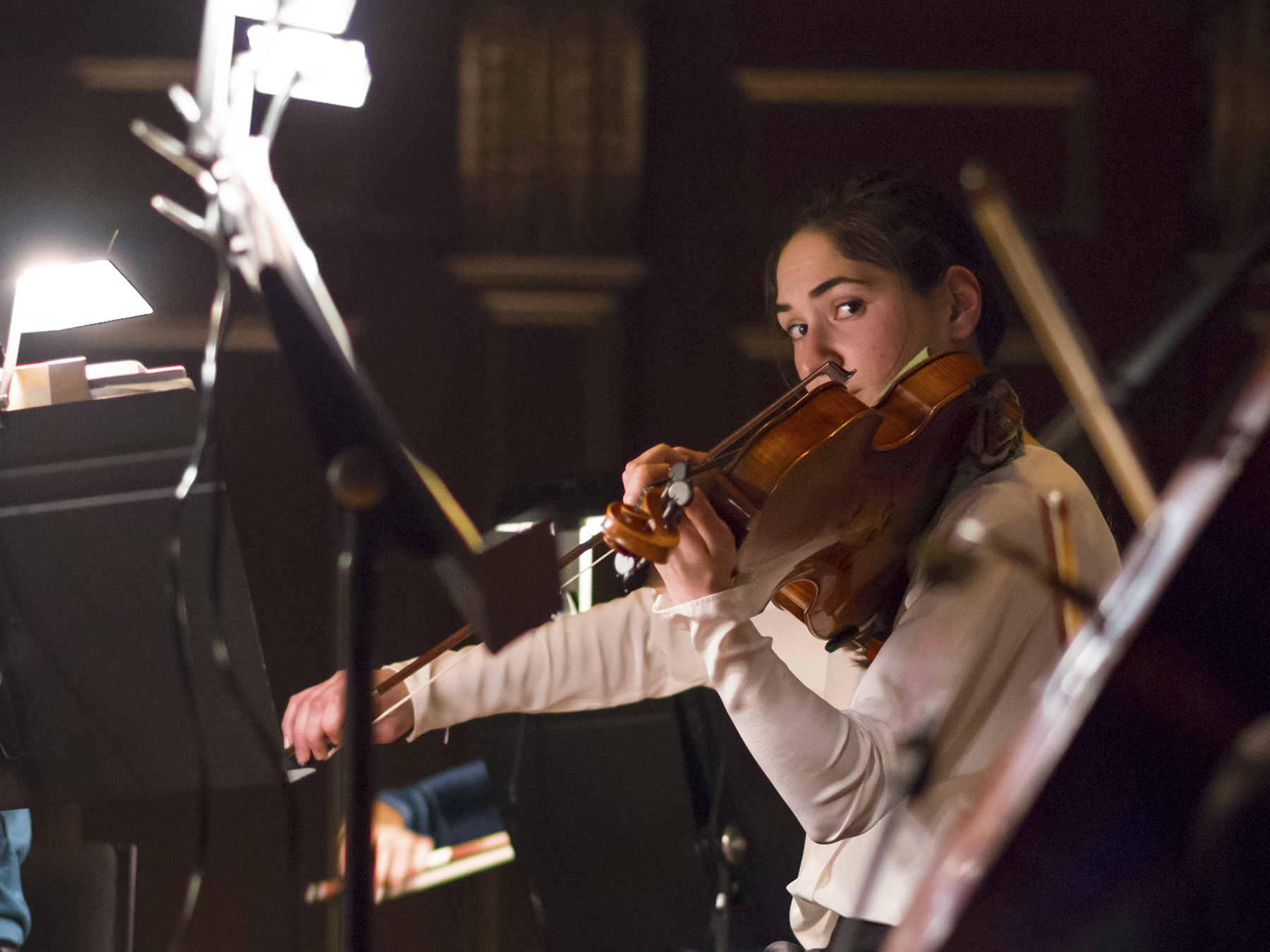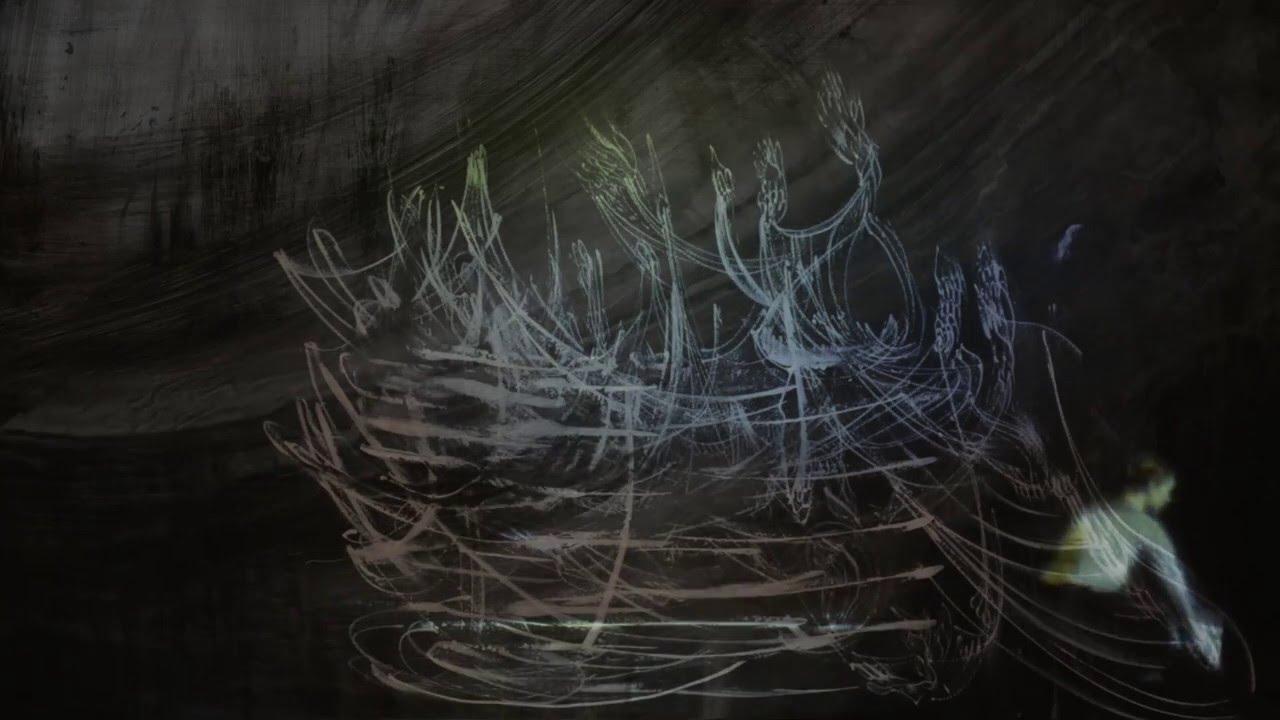Violist Hannah Rose Nicholas is dedicated to music as a means for building relationships with other cultures. Currently, Hannah plays in the New World Symphony in Miami under the direction of Michael Tilson Thomas, and was recently appointed Principal Viola of the Central City Opera Orchestra in Colorado. Hannah has been a soloist with the Lucerne Festival Academy Orchestra and the San Francisco Conservatory Orchestra, and has given solo performances at the Kennedy Center, at the New World Center in Miami, and as featured curator in the O, Miami Poetry Festival in 2016. Hannah also writes her own compositions, and her music has been performed at Houston’s James Turrell Skyspace and the Archway Gallery.
Hannah is inspired and influenced by the music, literature, and art from the Middle East and Jewish culture. She regularly collaborates with Iranian composer Sahba Aminikia, working together to explore ways of integrating contemporary Middle Eastern poetry into the music through speaking, recorded narration, and character of the music. Hannah is a founding member and female vocalist of the The alt Default, an indie rock-folk trio that won the Knight Arts Challenge South Florida for their Collaborative Songwriting Residency project at Fienberg Fisher K-8 public school, where they worked with middle school students on writing and performing original songs.
At NEC, Hannah studied with Kim Kashkashian, and was the EM Marketing Fellow with the chamber orchestra. Hannah is a recipient of the 2016 EM Alumni Award, which will fund in part her presentation of new work at the 2017 O, Miami festival.
Currently Living In: Miami Beach, FL

Tell me about your work and creative process with Sahba. His Iranian heritage is threaded through in a lot of his work—what kinds of themes are you most interested in exploring in your collaborations?
Sahba and I have been able to explore cross-cultural themes that I have always been drawn to, especially relating to exile and homeland. The first time that we collaborated was on a short piece for solo viola. We had met briefly, and I had given him free rein in the writing. The piece, entitled “Shetaban” (In Haste) ended up being rhythmically driven and included foot-stomps. I loved it immediately. The innate trust that developed during our initial collaboration stuck with both of us, and led us to a lasting musical partnership.
Our next collaboration was several years later, on a trio called “Ow’dat” (Return) for viola, clarinet, and piano with recorded narration. This piece is inspired by the works of Israeli poet Yehuda Amichai and Palestinian poet Mahmoud Darwish. When I first encountered their poetry, I was deeply struck by the overlapping language and moods evoked in the poems, especially pertaining to the theme of exile. When working on the concept of the piece with Sahba, he proposed that the narration be interwoven, with one line from one poem being followed by a line from the other. Two of our friends narrated the poetry, in English, Hebrew, and Arabic, their individual voices forming one narrative that is sustained above the music through the very last note of the piece.
Last April, I collaborated with the O, Miami Poetry Festival – a month-long festival with each day of the month dedicated to poetry-inspired events. My event was a performance that incorporated poetry and music, with audience members reading selected works aloud as part of the concert. The final piece on the program was the premiere of a string quartet with video that I worked on with Sahba as well as visual artist Kevork Mourad. This work features a poem by a female poet from Iran, Forough Farrokhzad, called “The Wind Will Blow Us Away.” Our quartet narrated the poem throughout the piece; the two violins and viola have spoken parts as well as playing parts. There is a strong rhythmic element to the piece underneath the lyrical and expressive outbursts, which helps keep the pacing as the visual portion unfolds. This was the first time I have worked in the media of visual art, music, and spoken-word, and the result, for me, was something both beautiful and provocative.
I will work with Sahba again for this season’s O, Miami festival, in addition to a local poet from Miami, and cannot wait to see what comes from this newest collaboration.
Your musical work covers many different genres. What do you love most about having such a varied performance career?

I love every aspect of it, from the creative possibilities to the challenge of learning, adapting, and getting better at making music in different ways. My confidence as a musician has grown a huge amount from performing in so many contexts. I will go from orchestra rehearsal to an outreach performance in a classroom of (somewhat intimidating!) middle-school students, where I’ll be singing original songs with my trio, The alt Default, and this demands focus and an ability to shift gears with confidence. Confidence is important not only for my own playing and performance, but also for what I am showing younger students when I teach or perform for them – I want to help them gain confidence as well.
Most of all, I love the people that I have gotten to know from pursuing a variety of musical endeavors. I went to Banff to do a residency in Persian and Eastern music traditions and my perspective broadened both from the immersion in those styles and from spending time with an amazing group of people.
As I step out of my comfort zone, I feel more and more possibilities open up. I am really happy to be in the music and art world, even during the most stressful moments.
You just won Principal Viola in Central City Opera. Congrats! What advice do you have for young auditioning orchestral players?
Prepare and treat the audition like a performance. The most important takeaway from this most recent audition for me had to do with my focus during the audition. On the day of, I made a mental note of the advice I had been given recently: focus solely on the character of the each musical excerpt. Even through nerves and distractions, I was mainly able to keep that focus during and in between the different rounds.
Just two days before the audition, I was performing Mahler’s Fifth Symphony at New World, under MTT. This was one of the most challenging and exciting performances I’ve ever experienced. It demanded a certain kind of focus starting from the moment I took my seat until my bow left the string after the final note. During the audition, instead of going into either autopilot or panic mode, I drew upon the stamina and energy that I had for Mahler 5.
Favorite NEC memory:

I have many! Performing with my piano quartet in Jordan Hall (Frost Quartet) for our honors performance in May, just before I graduated, was an amazing highlight. Another favorite memory is from the performance of Shostakovich Symphony no.11 in Symphony Hall – it was a turning point for me, where I experienced a huge array of emotions from both the music and from the energy that can be created in a great orchestral concert.
There are also some classes that I feel very nostalgic for, like Turkish Music with Robert Labaree and Jewish Music with Hankus Netsky. It was kind of scary at first singing out loud in some of these classes for certain assignments, but it turns out to have served me pretty well!
Current musical obsession:
I’m currently obsessed with the indie-folk genre of music (well I have been for a while!). That encompasses many different artists… I have been listening a lot to the album “I Want to See Pulaski at Night” by Andrew Bird, an artist I really admire.
On a classical-music note, as a result of taking this opera audition, I have listened to all of Puccini’s Madame Butterfly many times recently, including while on a run one time (that’s how much I love it!)

